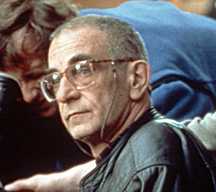
 Kieslowski
Krzysztof (1941-1996), Polish motion-picture director and screenwriter,
known for his social documentaries and also for his series of fiction
films based on moral themes. Kieslowski was one of the leading filmmakers
in Eastern Europe during the 1970s and 1980s. Born in Warsaw, he studied
filmmaking at the renowned Lódz Film School from 1964 to 1968.
His thesis film, Z miasta Lodzi (From the Town of Lódz, 1969),
was a documentary about workers' problems. Throughout the 1970s, Kieslowski
continued to balance documentary work with his work on narrative fiction
films. Always interested in the plight of individuals facing indifferent
and sometimes cruel social conditions, Kieslowski developed a distinctive
style within the Polish cinema movement known as the cinema of moral anxiety,
which sought to depict the lives of Poles under Communism.
Kieslowski
Krzysztof (1941-1996), Polish motion-picture director and screenwriter,
known for his social documentaries and also for his series of fiction
films based on moral themes. Kieslowski was one of the leading filmmakers
in Eastern Europe during the 1970s and 1980s. Born in Warsaw, he studied
filmmaking at the renowned Lódz Film School from 1964 to 1968.
His thesis film, Z miasta Lodzi (From the Town of Lódz, 1969),
was a documentary about workers' problems. Throughout the 1970s, Kieslowski
continued to balance documentary work with his work on narrative fiction
films. Always interested in the plight of individuals facing indifferent
and sometimes cruel social conditions, Kieslowski developed a distinctive
style within the Polish cinema movement known as the cinema of moral anxiety,
which sought to depict the lives of Poles under Communism.
Kieslowski's first fiction film, made for Polish television, was Personel (Personnel, 1975), about vindictiveness and corruption within the cast and crew of an opera production. Kieslowski came to the attention of the international film community with Amator (Camera Buff, 1979), a political satire about film censorship in Poland. In 1984 he made his first film coscripted with Polish lawyer Krzysztof Piesiewicz, Bez konca (No End), which depicts the bleak life of a young lawyer under martial law. Piesiewicz teamed with Kieslowski to coscript each of his subsequent films. Their next project together was Dekalog (Decalogue, 1988), a series of ten short films for Polish television that were also screened at major international film festivals. Each film was based on one of the Ten Commandments. Kieslowski's first commercial success in international theaters was a Polish-French coproduction, La double vie de Véronique (The Double Life of Véronique, 1990), about two women, one in France and one in Poland, who lead parallel lives. His last work was a trilogy of highly acclaimed films, also made in both France and Poland, known as the Trois Couleurs (Three Colors), each based on a different color of the French flag and the social principle it is meant to represent: Bleu (Blue, 1993), representing liberty, shared the prize for best picture at the Venice Film Festival; Blanc (White, 1994), representing equality, won the award for best director at the Berlin International Film Festival; and Rouge (Red, 1994), representing fraternity, was nominated for the best director prize at the Academy Awards festival. All three films vividly illustrate profound interconnections between people and across national borders. Kieslowski also published an autobiography, Kieslowski on Kieslowski, in 1993.
(Source: Microsoft¨ Encarta¨ Online Encyclopedia 2000 © 1997-2000 Microsoft Corporation. All rights reserved.)